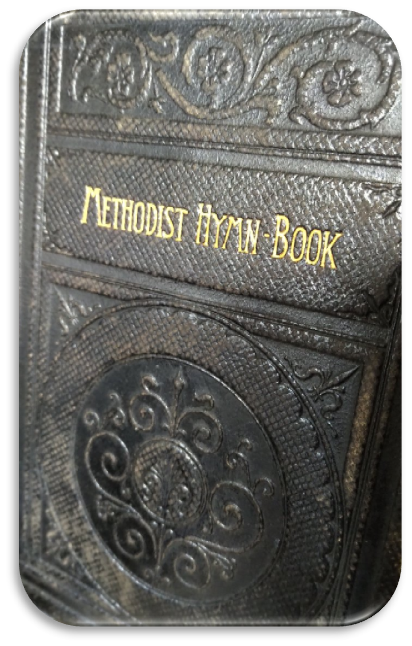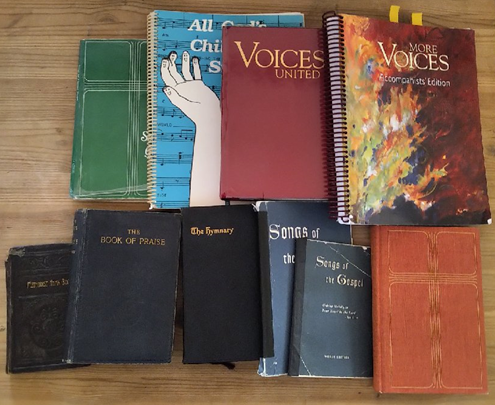
Cecile passed on this little
gem to me (pictured on the right here) when they were getting packed up for
their move. It is a Methodist hymnbook,
(Methodists were part of our founding congregations, where we get the dove in
our crest), and the preface described the need for a hymn book for the newly
amalgamated Methodist Church of Canada of 1874, between the Wesleyan Methodists
and the Methodist New Connexion of Canada. They wanted a Canadian hymnbook that
would unify them in song.
But there’s something about
hymn books that have the critics hunting for all the problems they can find. When Voices United came out, I went through
the Green Hymnbook to see which were kept and which were included. There were a few, like “Give me Oil in my
Lamp” that I was surprised didn’t make it.
So, it was amusing to see someone wrote in this old copy, “Why omit
Charles Wesley’s ‘Rejoice the Lord is King?’”
Testing the decisions of the
hymn committee. We do that. We test.
We challenge. We question, especially
anything that is new. Maybe because we
are in a grumpy mood, or because we have a level of expertise that is higher
than what we think the other person has. Or because we have an idea worth
contributing. Or because we are coming
from a less than humble attitude of superiority. Or because we find someone else’s idea
threatening. Or even worse, because we
find that person themself threatening.
The lawyer felt threatened by Jesus’
new approach. Maybe he distrusted the charisma
or the leadership skills, the new ideas or the sense of authority or the growth
of new disciples and followers. Maybe he
had a toothache that day, or his supper hadn’t agreed with him. Regardless, he didn’t like what Jesus was
doing, and he was determined to test Jesus.
So Jesus pulled out a story
that has become so famous that as soon as we hear the words “Good Samaritan”,
we know it. Folks who have never heard
the story may still know the phrase, and it’s interesting that when I got my
Naloxone training, I was told about the ‘Good Samaritan’ law, which was put in
place so that if one addict tries to save another addict’s life from an
overdose, they will not be arrested. Good
Samaritan was even used this week for a CBC story of people helping pull a man
out of a burning car in Ontario. It’s a familiar phrase and there may be people
who have no idea that Jesus invented it in response to being tested.
It was a shocking story,
deliberately challenging the lawyer so badly that he could not answer Jesus’
question of who actually acted like a neighbor.
If Jesus was here today, the story would be about a Ukrainian civilian
who was hurt in a missile strike. A
Ukrainian Orthodox priest walked by and crossed to the other side instead of
taking care of the wounded civilian, then President Zelensky also walked by and
again crossed to the other side. Then a
Russian soldier walking by found the Ukrainian civilian, dug them out from the
rubble of what was left of their house, and carried them to the nearest
hospital. The soldier gave the hospital
money for antibiotics and promised to take care of any additional expenses on
their return. The shock of the Russian
being the one to help is like the scandalized lawyer’s inability to even say
the word ‘Samaritan’.
Jesus tested him, "Which of these
three was the neighbor?" The lawyer
answered, "The one who showed kindness."
Jesus challenged his tester to
move beyond wordsmithing and legalese, logic puzzles and abstract philosophy which
put following God into an intellectual exercise for abstract arguments. Jesus wanted his tester to see the debate
about defining neighbor more than mental gymnastics, but something that
challenged the emotions as well as the logic.
And not only moving it from an ethical debate to an exercise in empathy,
ultimately moving it into the realm of action.
As one Maritime song put it, move from the head to the heart to the
hands. How do we get our faith to move
in that direction?
Someone recently joked that the
difference between the Methodists and the Presbyterians is that when you tell a
Methodist about a problem, they will say, “I will pray for you”. When you tell a Presbyterian, they will say,
“I will think about you.” We who are United
can combine the best of both worlds, think, pray, and see what we can do, not
to take over and fix things for people which just enables them, but what we can
do to empower them, help them come up with their own actions and support those
actions as best we can. Our hymns can
help us do that. When we read the words
of the hymns, we engage our thinking.
When we hear the music, we engage our feelings. When we sing the words, we engage our bodies
in acting on the words and
feelings. Test, empathize and act in
compassion and love. The more we do
that, the more we become able to think of and respond to the neighbors we are
called by God to love. May it be so for us all!



No comments:
Post a Comment